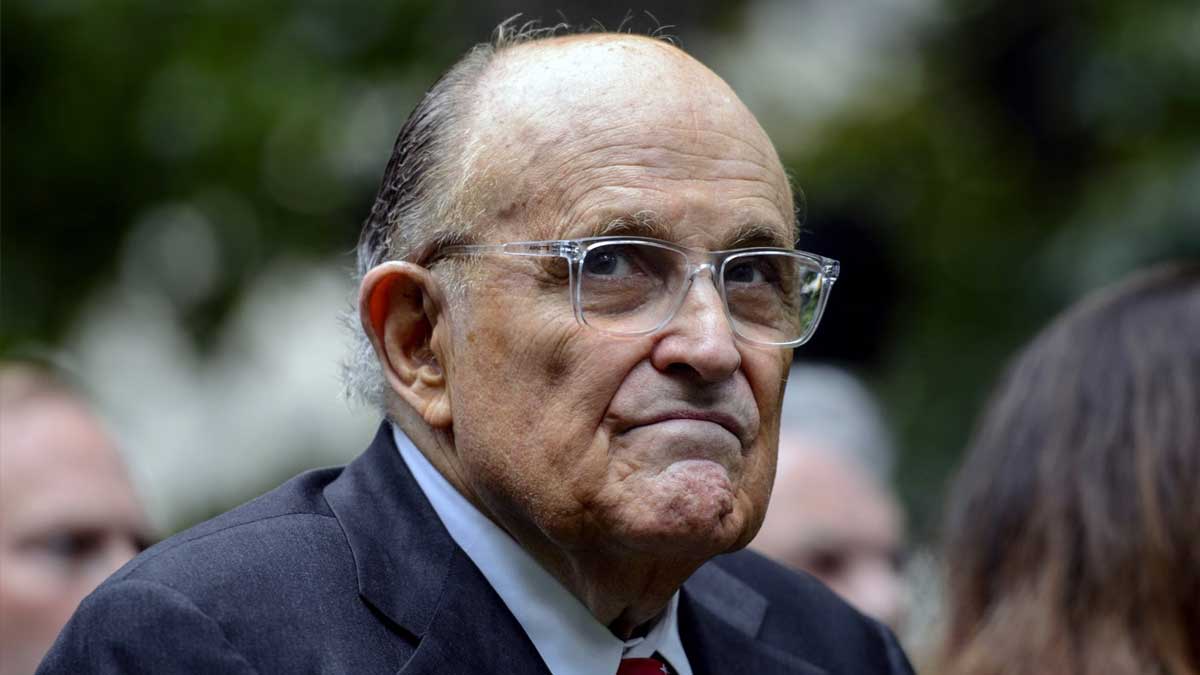- Home
- Billionaires
- Investing Newsletters
- 193CC 1000
- Article Layout 2
- Article Layout 3
- Article Layout 4
- Article Layout 5
- Article Layout 6
- Article Layout 7
- Article Layout 8
- Article Layout 9
- Article Layout 10
- Article Layout 11
- Article Layout 12
- Article Layout 13
- Article Layout 14
- Article Sidebar
- Post Format
- pages
- Archive Layouts
- Post Gallery
- Post Video Background
- Post Review
- Sponsored Post
- Leadership
- Business
- Money
- Small Business
- Innovation
- Shop
Recent Posts
Rudy Giuliani Disbarred in New York for False 2020 Election Claims

On Tuesday, Rudy Giuliani, the former New York City mayor and attorney for former President Donald Trump, was formally disbarred in New York due to his involvement in promoting false claims of election fraud related to the 2020 Presidential election. This decision marks a significant legal and professional setback for Giuliani, a once-celebrated figure in Republican circles who now faces extensive civil and criminal charges tied to his post-election actions.
The disbarment decision was rendered by the Manhattan appeals court, which found Giuliani’s behavior to be a severe breach of legal ethics. According to the court, Giuliani had made a series of deliberate and misleading statements across various platforms, all aimed at eroding public trust in the electoral system and casting doubt on the legitimacy of the U.S. government. The court’s ruling underscores the gravity of his actions, describing them as attempts to undermine the democratic process and destabilize the electoral system.
The court’s decision was particularly critical of Giuliani’s conduct, emphasizing that he “flagrantly misused his prominent position” to disseminate falsehoods about the election. The ruling noted that his actions not only violated core principles of the legal profession but also contributed significantly to the national unrest that has followed the 2020 Presidential election. This ruling reflects a broader condemnation of efforts to disrupt democratic processes and highlights the role of legal professionals in upholding electoral integrity.
Giuliani’s legal troubles extend beyond New York, where his law license was initially suspended in 2021. He also faces criminal charges in Arizona and Georgia, where he is accused of playing a key role in attempts to overturn the results of the 2020 election. These charges are part of a broader investigation into the efforts by Trump’s legal team to challenge the election results, which have included various allegations of fraud and misconduct.
Ted Goodman, a spokesperson for Giuliani, has criticized the disbarment ruling, calling it “objectively flawed.” Goodman announced that Giuliani intends to appeal the decision, arguing that the ruling is politically motivated and ideologically biased. This criticism reflects ongoing tensions between Giuliani’s supporters and the legal system, with some perceiving the disbarment as part of a broader political campaign against him.
The appeals court’s ruling has emphasized the seriousness of Giuliani’s misconduct, stating that “the seriousness of respondent’s misconduct cannot be overstated.” This assessment reflects the court’s view that Giuliani’s actions represent a significant violation of legal ethics and have had far-reaching consequences for public trust in the electoral system. The decision is a stark reminder of the ethical standards expected of legal professionals and the potential consequences of failing to adhere to these standards.
In addition to the disbarment, Giuliani faces potential further repercussions in Washington, D.C. In May, the D.C. Board on Professional Responsibility recommended that Giuliani be disbarred for allegedly abusing his legal license to undermine the election. The final determination of this recommendation will be made by a D.C. appeals court, although a date for this decision has yet to be announced. This forthcoming decision will determine whether Giuliani will face similar disciplinary action in the nation’s capital.
Giuliani’s legal troubles are rooted in his role as one of Trump’s primary advocates in the aftermath of the 2020 election. He was a central figure in promoting unverified claims of election fraud, arguing that the election had been stolen from Trump. His claims included allegations of widespread fraud and a conspiracy involving Democrats to ensure Biden’s victory. These assertions were largely discredited and led to legal and financial consequences for Giuliani.
In addition to the disbarment, Giuliani faced substantial financial repercussions from defamation lawsuits filed by Dominion Voting Systems and Smartmatic, two companies whose voting machines were falsely implicated in his fraud claims. The lawsuits resulted in a $148 million judgment against Giuliani for defaming election workers in Georgia. Following these legal and financial setbacks, Giuliani declared bankruptcy, further complicating his financial situation.
The disbarment and ongoing legal challenges against Giuliani highlight the broader impact of his efforts to challenge the 2020 election results. As he continues to navigate these legal battles, the outcomes will likely influence public perceptions of Giuliani and the broader political and legal context of the election. The legal community and the public will be closely monitoring these developments, as they represent significant issues related to legal ethics, political accountability, and the integrity of the democratic process.
Recent Posts
Categories
- 193cc Digital Assets2
- 5G1
- Aerospace & Defense46
- AI37
- Arts3
- Banking & Insurance11
- Big Data3
- Billionaires449
- Boats & Planes1
- Business328
- Careers13
- Cars & Bikes76
- CEO Network1
- CFO Network17
- CHRO Network1
- CIO Network1
- Cloud10
- CMO Network18
- Commercial Real Estate7
- Consultant1
- Consumer Tech180
- CxO1
- Cybersecurity68
- Dining1
- Diversity, Equity & Inclusion4
- Education7
- Energy8
- Enterprise Tech29
- Events11
- Fintech1
- Food & Drink2
- Franchises1
- Freelance1
- Future Of Work2
- Games141
- GIG1
- Healthcare78
- Hollywood & Entertainment186
- Houses1
- Innovation42
- Investing2
- Investing Newsletters4
- Leadership65
- Lifestyle11
- Manufacturing1
- Markets20
- Media193
- Mobile phone1
- Money13
- Personal Finance2
- Policy567
- Real Estate1
- Research6
- Retail1
- Retirement1
- Small Business1
- SportsMoney33
- Style & Beauty1
- Success Income1
- Taxes2
- Travel10
- Uncategorized8
- Vices1
- Watches & Jewelry2
- world's billionaires418
Related Articles
Trump Moves $4B Stake in Truth Social Parent, Stock Drops 6%
Donald Trump recently transferred his 57% stake in Trump Media & Technology...
By 193cc Agency CouncilDecember 20, 2024House Rejects Trump-Backed Funding Bill, Shutdown Looms
The U.S. House of Representatives rejected a new government funding bill on...
By 193cc Agency CouncilDecember 20, 2024Trump Named Time’s Person of the Year for Second Time
On Thursday, Time magazine honored Donald Trump as its “Person of the...
By 193cc Agency CouncilDecember 12, 2024Meta Donates $1 Million to Trump’s Inaugural Fund
Meta, the parent company of Facebook and Instagram, has confirmed a $1...
By 193cc Agency CouncilDecember 12, 2024















Leave a comment